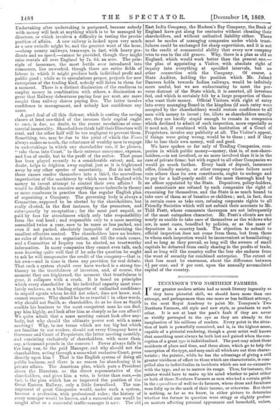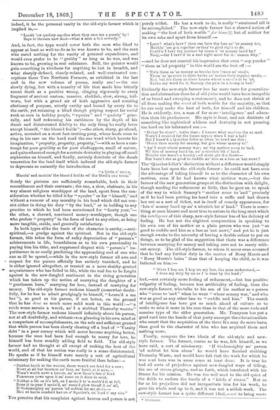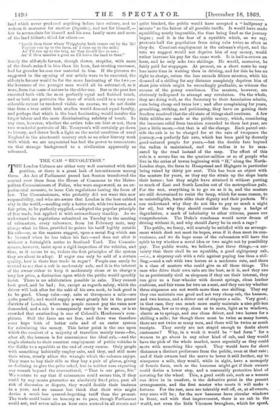TENNYSON'S TWO NORTHERN FARMERS.
IF our greater modern artists had as much literary ingenuity as they have pictorial skill, we should have more than one attempt, and perhaps more than one more or less brilliant attempt, in the next Royal Academy to paint Mr. Tennyson's Two Northern Farmers, old style and new style, as pendants to each other. It is not at least the poet's fault if they are never as vividly portrayed to the eye as they are already to the imagination of his millions of readers. Every point in the situa- tion of both is powerfully conceived, and is, in the highest sense, capable of a pictorial rendering, though a great artist well knows that something must always be both lost and gained when the con- ception of a great type is individualized. The poet may select those accidents of place and time, and those alone, which go to help the conception of the type, and may omit all which are not thus charac- teristic ; the painter, while he has the advantage of giving a still greater vividness of effect to those which are characteristic, is com- pelled also to individualize in incidents which are not co-extensive with the type, and so to narrow its range. Thus, for instance, the painter would have to make up his mind whether to paint either or both of these Northern Farmers as men who had a certain pride in the expenditure of well-to-do farmers, whose dress and furniture were fully up to the mark of their income, or otherwise. But there is nothing, as far as we know, in either picture to determine whether the farmer in question were stingy or slightly profuse on matters affecting personal appearance and household, unless,
"Leak 'ow quoloty smoiles when they sees ma a passin' by !
Says to thessen naw doot—what a man a bra sewerly."
And, in fact, the type would cover both the man who liked to appear at least as well-to-do as he was known to be, and the man who cared nothing for the vanity of personal expenditure, and would even prefer to be " grubby " so long as he was, and was known to be, growing in real substance. Still, the painter would gain something in vividness for anything he lost in breadth, and what sharply-defined, closely-related, and well-contrasted con- ceptions these Two Northern Farmers, as exhibited in the last and in the new volume of poems, really are !— the one slowly dying, but with a tenacity of life that made him bitterly resent death as a positive wrong, clinging vigorously to every fragment of ancient custom, massive, cloddish, slow, strong, toil- worn, but with a grand air of both aggressive and resisting obstinacy of purpose, utterly earthy and bound by every tie to the earth, yet retaining a blind though pitying respect for social rank as seen in holiday people, " squoire " and " quoloty " gene- rally, and half redeeming his earthiness by the depth of his dumb and disinterested fidelity to the only thing he really loves except himself, " the blessed fealds";—the other, sharp, go-ahead, active, mounted on a stout fast-trotting pony, whose hoofs seem to ring in his ears on the hard road the one word which haunts his imagination, "proputty, proputty, proputty,"—with as keen a con- tempt for poor gentility as for poor clodhoppers, small of nature, and quite educated enough for a certain dexterity in playing off small sophistries on himself, and finally, entirely destitute of the dumb veneration for the land itself which induced the old-style farmer to deprecate so earnestly the introduction of
"a kittle o' steam, Huzzin' and malizin' the blessed felilds wi' the Divil's olio. team."
Surely the pictures are sufficiently remarkable, both in their resemblances and their contrasts ; the one, a slow, obstinate, iu his way almost religious worshipper of the land, apart from the con- sideration whether he tilled it for " squoire " or for " himself," and without a rumour of any morality in his head which did not con- sist either in doing his duty " by the loud," or in holding to any practice to which he had been accustomed for " foorty year,"— the other, a shrewd, convinced money-worshipper, though one who prefers " proputty" in the form of land to any other, as being more tangible, stable, and generally satisfactory. indeed, it be the personal vanity in the old-style farmer which is implied in,— In both types alike the basis of the character is earthy,—anti- spiritual,—a grudge against the spiritual. But in the old-style farmer, this takes the form of sulky depreciation of " parson's " achievements in life, boastfulness as to his own punctuality in paying him his tithe, and suppressed disgust with " parson's " im- pertinence in so coolly predicting the approaching end of one who can so ill be spared,—while in the new-style farmer all awe and respect for the parson officially has entirely vanished, and he is either ignored altogether, or treated as a mere shabby-genteel acquaintance who has failed in life, while the real foe to be fought against is the new-fangled sentiment in the rising generation which has taken up the notion of marrying the daughter of a " gentleman burn," marrying for love, instead of Marrying for money. The old-style farmer reckons himself (somewhat doubt- fully, for he has to admit grudgingly to himself, " Learn'd a ma bed "), as good as his parson, if not better, on the ground that he has done so much more solid work in this world :—" a reads worm sarmiu a weeak, an' I a stubbed Thornaby. waiiste." The new-style farmer reckons himself infinitely above his parson, not at all doubtfully, and without even glancing in his own mind at a comparison of accomplishments, on the sole and sufficient ground that while parson has been slowly clearing off a load of "'Varsity debt " in a poor curacy which will never become anything better, because the man had been fool enough to marry for love, he himself has been steadily adding field to field. The old-style farmer had no thought at all except of making the best of this world, and of that his notion was really in a sense disinterested. He speaks as if he himself were merely a sort of agricultural missionary for making the earth more fruitful than before :—
" Dubbut looak at the waaste, theer wern't not feud for a cow ; Nowt at all but bracken an' fuzz, an' looak at it now,— Warn't worth nowt a haacre, an' now theer's lots o' teal Fourscore yows upon it an' some on it doon in Bead. "Nobbut a bit on it's left, an I melin'd to 'a stubb'd it at fall, Done it to-year I melin'd, an' runn'd plow thruff it an' all, If Godamoighty an' parson 'ud nobbut let me aloha,— Meg wi halite oonderd haiizre o' Squoire's, an' load o' my oan."
You perceive that his complaint against heaven and parson is not purely selfish. He has a work to do, is really "straitened till it be accomplished." The new-style farmer has a shrewd notion of making the best of both worlds "for himself, but of neither for its own sake and apart from himself :-
" Luvv ? what's lava ? thou can luvv thy lass an' er munny too, Malikin' 'em goa together as they've good right to do. Could'n I luvv thy muther by cause o"er ?Nanny Isla by ? Nady,—fur I luvv'd 'er a vast sight moor fur it : reason why."
—and he does not conceal his impression that even " oop yonder " " them as 'ad proputty " in this world are the best off :—
" Tis'n them as 'as munny as breaks into 'oases an' steals, Them 'as 'as coats to their backs an' taiikes their regular meals,— Noii, but its them as nicer knawa wheer a meal's to be 'ad. Teaks my word for it, Sammy, the poor in a loomp is bad."
Evidently the new-style farmer has far more taste for generaliza- tion and abstraction than he of old (who would have been incapable of so broad and sweeping a statement), and he does not shrink at all from making the worst of both worlds for the majority, so that he can only make the best of both, for himself and his children. He is evidently, too, a man of far more intelligence' and educa- tion than his predecessor. His style is freer, and not destitute of something like sophistical address and dexterity in not pressing too hard on his infatuated son :—
"Do'ant be stunts: taiike time: I knaws what maii'tes tha sa mad. Warn'[ I craazed fur the lasses mystin when I war a lad ? But I knaw'd a Qualiker feller as often 'as towd me this : Dant thou marry for munny, but gea wheer mutiny is!'
"An' I went wheer munny war ; an' thy mother coom to 'and, Wi' lots of munny lama by, an' a nicetish bit o' land. Maybe she warn't a beauty ; —I nicer gic it a thowt- But warn't she as good to cuddle an' kiss as a lass as 'ant nowt ?
The • Quaiiker feller's' distinction without a difference would simply have been lost upon the old-style farmer : he could not have seen the advantage of taking himself in as to the character of his own motives, even if he had known what motives were,—but the farmer of the new generation grasps at the distinction with delight, though needing the refinement so little, that he goes on to speak of the way in which Sammy's " mother come to 'and " precisely as if he had been putting his hand into a raffle and had drawn her out as a sort of ticket, not in itself of comely appearance, for lots o' munny laaid up an' a nicetish bit o' land." There is some- thing at once bizarre and most true to nature in the long start which the intelligence of this sharp, new-style farmer has of his delicacy of feeling. He has not the slightest compunction in speaking to his own son of his mother as a plain person who was just " as good to cuddle and kiss as a lass as 'ant nowt," and yet he is just enough awake to the necessity of having a double colour to put on things, as to be glad of the suggestion that there was a difference between marrying for money and taking care not to marry with- out money. The old-style farmer, to whom it never even occurred that he had any further duty in the matter of Busy Mauls and " Bossy Marris's bairn" than that of keeping the child, as it was fathered on him
'Siver I kep un, I kep un my lass, tha mun understond,— I done my duty by un as I 'a done by the load ;"
had,—not certainly more feeling of refinement,—but less positive vulgarity of feeling, because less artificiality of feeling, than the new-style farmer, who talks to his son of his mother as a person who " come to 'and " when he went " wheer 'nanny war," and who was as good as any other lass to " cuddle and kiss." The march of intelligence has here got so much ahead of culture as to make us miss it more in his case than in that of the more rude and massive type of the older generation. Mr. Tennyson has put a good card into the hands of that party amongst the educationalists who assert that the acquisition of the three It's may do more harm than good to the character of him who has acquired them and nothing more.
Finally, compare the two ideals of the old-style and new- style farmer. The former, coarse as he was, felt himself, as we have said, a sort of missionary. If Godamoighty an' parson 'ud nobbut let him aloan ' he would have finished stubbing Thoruaby Waste, and would have felt that the work for which he was sent here was in some sense at least done. It is true he had all sorts of prejudices against new-fangled ways of tilling, the use of steam-ploughs, and so forth, which interfered with his fitness for his mission. Ile was too well used to the old quiet of the fields to endure the bustle of a "kittle o' steam." But so far as his prejudices did not incapacitate him for his work, he gave his whole soul up to it, and it was not a selfish work. The new-style farmer has a quite different ideal,—not to bring waste
• Obstinate.
land which never produced anything before into culture, and to redeem it moreover for another (Squoirc), and not for himself,— but to accumulate for himself and his own family more and more of the land hitherto tilled for others :—
"Looiik thou theer wheer Wriggleeby beck comes out by the 'ill! Foyther run up to the farm, an' I runs up to the mill ; An' I'll run up to the brig, an' that thou'll live to see ; An' if thou marries a good un I'll leave the land to thee."
Surely the old-style farmer, though slower, stupider, with more of the dumb animal in him than his keen, fast-trotting successor, had far grander human raw material in him. If the pictures we suggested in the opening of our article were to be executed, the old-style farmer would be far the more fascinating of the two ;- the keenness of the younger man would all be subtracted, as it were, from the mass of nature in the older one. But as the poet has executed both with the most perfectly equal and finished touch, and as both are portraits the lines of which could to a very con- siderable extent be rendered visible on canvas, we do not doubt that from a true artist both studies would demand equal faculty, and perhaps that which is the least fascinating would involve the larger labour and the more discriminating subtlety of touch. In any case, however, whether the artists take our hint or not, these two wonderful portraits of Mr. Tennyson's will certainly go down to history, and throw back a light on the social condition of rural England in the nineteenth century such as no other literary work with which we are acquainted has had the power to concentrate on that strange background to a civilization apparently so advanced.








































 Previous page
Previous page